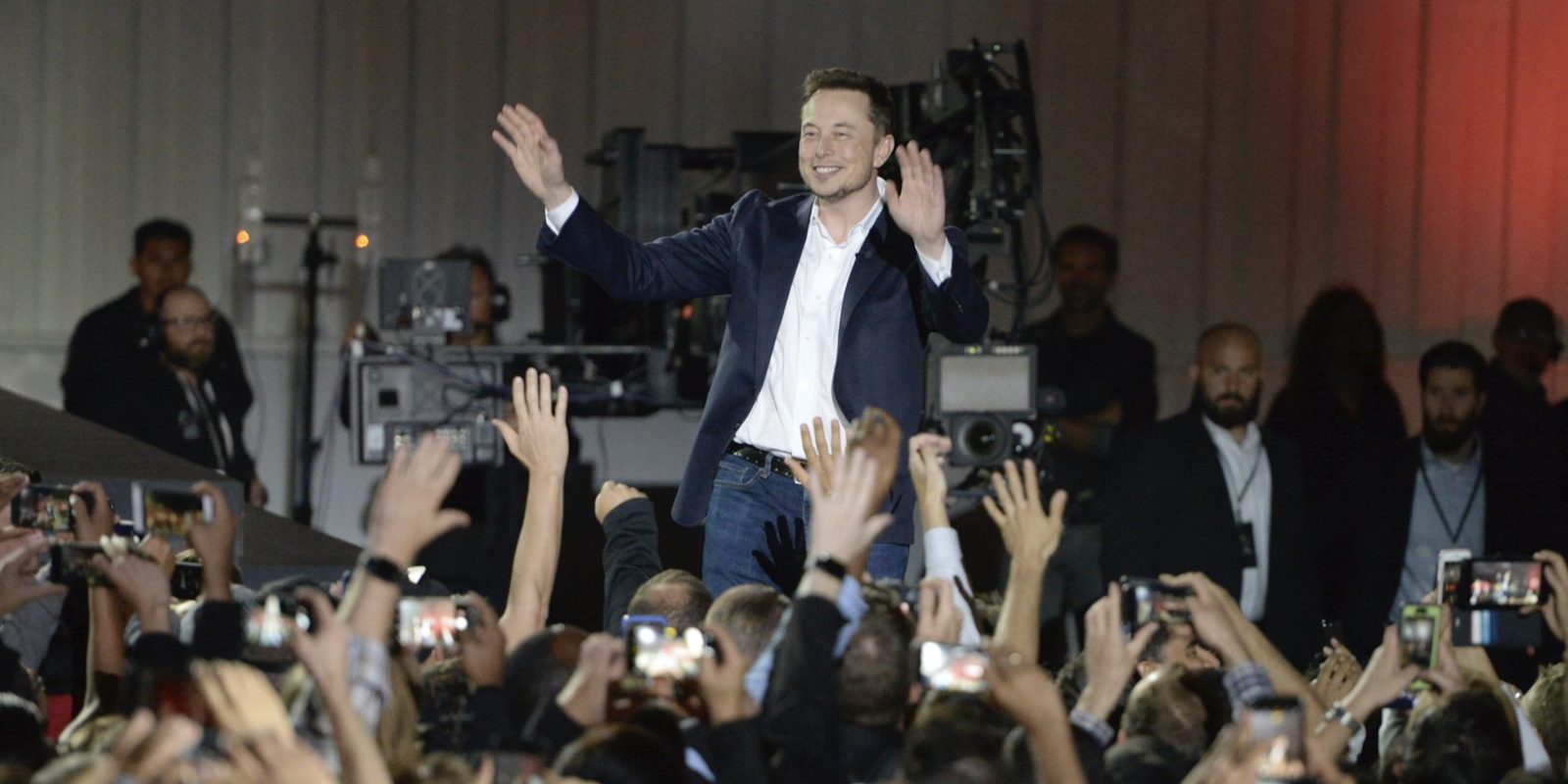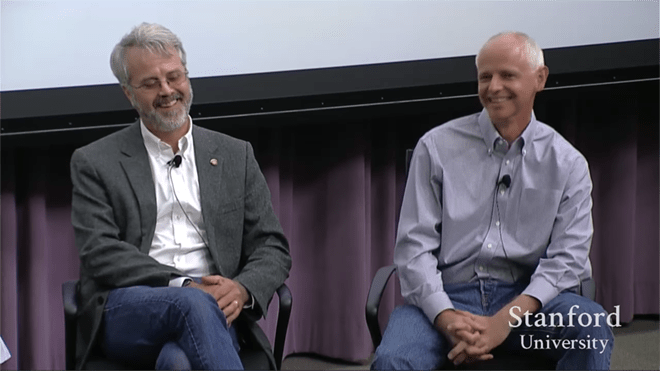
Elon Musk is technically a “founder” of Tesla, as per a court docket settlement. He deserves credit score for Tesla’s succes, however it’s true that he isn’t behind Tesla’s primary innovation.
Whereas I’m no fan of Elon Musk, I care extra concerning the fact than smearing him, which isn’t the case for lots of his haters. Certainly one of their go-to lies they wish to repeat is that he’s not a “founder” of Tesla.
It’s one thing they use to attempt to discredit his achievements: “He isn’t a founder or inventor. He simply buys concepts from others.”
Whereas there’s some fact to it, it’s not the entire fact. I felt like it could be important to set the file straight.
The early story of Tesla
Tesla was formally integrated on July 1, 2003, by Martin Eberhard and Marc Tarpenning with the aim of constructing an electrical car producer that can be a know-how firm – an concept that’s nonetheless core to Tesla at this time.
In funding supplies, Eberhard and Tarpenning’s early Tesla acknowledged a aim to develop core applied sciences associated to “the battery, the pc software program, and the proprietary motor.” These are nonetheless Tesla’s core applied sciences at this time.

However Tesla’s most vital innovation was the use and packaging of cylindrical li-ion battery cells, beforehand primarily utilized in shopper digital merchandise, like laptops, in giant battery packs for electrical automobiles.
That was actually a recreation changer and it’s an concept that precede Elon Musk’s involvement with Tesla.
Whereas integrated in 2003, Eberhard and Tarpenning had been engaged on the thought for some time. That they had beforehand based NuvoMedia the place the 2 founders constructed of an early handheld machine, the Rocketbook, an e book reader, again in 1996.
They bought the corporate in 2000, however earlier than that, they have been engaged on the next-generation of their e book and in sourcing the batteries, they famous some spectacular enhancements within the capability and price of li-ion battery cells.
The 2 engineers had critical considerations about local weather change and oil import. They did the maths and concluded that powering transportation with batteries utilizing renewable vitality would have a big impression on decreasing emissions and local weather change.
Tesla didn’t invent electrical vehicles. That they had been round for 100 years by the point the corporate was based, however they required making compromises in comparison with fossil fuel-powered automobiles, which prevented them for gaining in recognition.
That was Tesla’s difference-maker: making vehicles with the newest li-ion battery cells developed for shopper electronics, leading to electrical automobiles with out compromises.
This core concept have been mirrored in Eberhard’s guiding rules for Tesla:
1) An electrical automotive shouldn’t be a compromise. With the proper know-how selections, it’s potential to construct electrical vehicles which are truly higher vehicles than their competitors.
2) Battery know-how is vital to a profitable electrical automotive. Lithium ion batteries will not be solely appropriate of automotive use; they’re game-changing, making first rate driving vary a actuality.
3) If designed proper, electrical vehicles can enchantment to even essentially the most critical automotive fanatic, as electrical drive is able to critically outperforming inner combustion engines.
That has been the idea of Tesla’s success. The thought of leveraging the unbelievable progress with li-ion batteries within the Nineties to ship electrical automobiles with no compromise.

This was Tesla’s core innovation. It sounds easy, nevertheless it took unbelievable work. No battery producer wished to construct li-ion cells for EVs, so Tesla had to purchase off-the-shelves cells meant for laptops and bundle 1000’s of those cylindrical cells into battery modules and packs that might be viable in a automotive. It’s an concept that had by no means been completed earlier than.
And an concept is price nothing with out execution.
Tesla couldn’t have occurred with out Elon Musk
Musk claims that his curiosity in electrical automobiles predates Tesla. There’s no purpose to not imagine him, however there’s no proof that he had something to do with the abovementioned idea.
In truth, earlier than his foray into Silicon Valley’s web startup increase, Musk went to Stanford College to review supercapacitors, which he claims he did with the hope of utilizing them in electrical automobiles. This may recommend that he thought supercapacitors can be the way forward for EVs somewhat than Li-ion batteries.
Musk and Tesla bought collectively via an organization known as AC Propulsion.
AC Propulsion pioneered the resurgence of electrical automobiles and constructed the tZero electrical sports activities automotive within the Nineties.

First, it used lead-acid batteries like its predecessors, however the firm transformed it to lithium-ion battery cells within the early 2000s. It’s not clear who had the thought first or if it was parallel considering, however we do know that AC Propulsion and Eberhard have been involved through the conversion.
Eberhard tried to persuade AC Propulsion to commercialize the brand new tZero, however the firm refused as a result of it targeted on one other product. That’s when Eberhard and Tarpenning determined to launch Tesla.
How did Musk come into the image?
Musk, who was engaged on SpaceX on the time, was contacted by JB Straubel, a younger electrical engineer with a longstanding curiosity in electrical automobiles, together with constructing his personal Porsche EV in his storage.
Recent out of college, Straubel was engaged on high-altitude hydrogen-powered electrical plane on the time—one thing that was of curiosity to Musk, so that they bought collectively. The conversion ultimately pivoted to electrical automobiles, and Straubel, being deeply linked on this small world, made Musk conscious of AC Propulsion.
They test-drove the tZero with lithium-ion batteries, and Musk was bought. Like Eberhard, he tried to persuade AC Propulsion to commercialize the product. Tom Gage, AC Propulsion’s CEO, once more refused, however since they have been considering the identical method, he linked Musk to Eberhard, who had simply launched Tesla with Tarpenning, together with Ian Wright, who had joined the 2 engineers.
Just a few months later, in February 2004, Musk led Tesla’s collection A funding spherical, with $6.5 million of the $7.5 million coming from his pockets.
Eberhard turned CEO, and JB Straubel, who, regardless of his younger age, had essentially the most expertise constructing electrical vehicles, joined as Chief Expertise Officer.
Musk was busy with SpaceX, however he was extra energetic inside Tesla than merely being an investor and board member.
As Tesla was engaged on the Roadster, Musk led a number of different rounds of financing, offering a big a part of the funding himself.
Issues turned for the more severe in 2007. Tesla was having points bringing the Roadster to manufacturing inside its funds. The transfer to make use of the Lotus Elise chassis proved to be a mistake, and by the tip, the Tesla Roadster had solely shared 6% of its components with the Elise, as most of it needed to be reworked.
In the summertime of 2007, the board, led by Musk, requested Eberhard to step down. A number of interim CEOs adopted earlier than Musk took over himself in 2008.
Eberhard totally left the corporate, and in 2009, he sued each Tesla and Musk for ousting him. Either side accused one another of being behind Tesla’s issues, and Eberhard claimed Musk was “rewriting historical past” as if he had based Tesla himself.
In the end, a decide dismissed a part of Ebarhard’s lawsuit, after which each events settled and agreed that 5 individuals may name themselves co-founders at Tesla: Eberhard, Tarpenning, Wright, Musk, and Straubel.
Electrek’s Take
Now, in a civil case like this, the end result shouldn’t be essentially essentially the most simply. Usually, these with essentially the most cash and the very best attorneys win.
So, I’m not going to assert that there’s no worth in questioning whether or not or not Elon is really a Tesla founder. I get that there’s nuance right here, however all events concerned have settled the matter. My primary level is that it doesn’t actually matter.
Tesla’s core concept was to create an electrical car with out compromise by leveraging enhancements in lithium-ion battery cell know-how. Nonetheless, all proof factors towards Musk’s not being concerned with this core concept.
With that mentioned, we have to give credit score the place credit score is due. He acknowledged it as a good suggestion and put extra money into making it occur than any was keen to do on the time.
Subsequently, you might make the argument that Tesla wouldn’t have occurred with Musk – making the founder argument moot.
After that, you even have to present some credit score to Musk for Tesla’s success. He has been the CEO since 2008 and the corporate achieved unbelievable issues beneath his management. They succeeded in making EVs mainstream and pushed the business to transition to battery-electric automobiles.
To today, it’s Musk’s authentic ‘Tesla Secret Grasp Plan’ in 2006 that satisfied me Tesla can be the corporate to carry EVs into the mainstream. The plan made sense, and it was executed beneath his management. He took the unique concept, fleshed it out, financed it, after which led the crew that made it occur.
The final level is vital as a result of that’s the place I begin to agree with Musk’s naysayers once more. Musk’s followers like to assert that he’s some type of engineering genius. Jamie Dimon simply known as him “our Einstein”. Whereas I can admit that Elon is wise and has an above-average understanding of many physics and engineering rules, evaluating him to one of the crucial impactful theoretical physicists of all time is pure insanity.
Whereas Musk has made technical contributions to Tesla, I believe they’re typically overblown by his fanbase and Tesla’s crew doesn’t get sufficient credit score. JB Straubel, Tesla’s longtime Chief Expertise Officer till 2019, and his groups ought to get the overwhelming majority of the credit score for the technical contributions and developments to battery know-how and energy electronics that made Tesla profitable.
There are too many to call all of them, however I’ve been reporting on Tesla for greater than a decade. By means of my reporting, sources have praised individuals like Straubel, Drew Baglino, Kurt Kelty, Colin Campbell, Peter Rawlinson, Charles Kuehmann, Alan Clarke, Dan Priestley, Lars Moravy, David Zhang, Evan Small, and Franz von Holzhausen for his or her contributions to Tesla.
Briefly, sure, it’s OK to say Elon Musk co-founded Tesla. Sure, he had a essential function within the firm’s survival and success, however I additionally assume it’s truthful to say that he wasn’t behind Tesla’s primary innovation, and the corporate’s prime skills don’t get almost sufficient credit score for delivering on the mission.
The mission to speed up the world’s transition to sustainable vitality is a wonderful one and it’s what attracted a lot of the highest expertise at Tesla.
Sadly, Musk’s management over the previous few years has steered Tesla away from that mission, which is my primary fear concerning the firm.
Regardless, I wished to set the file straight on his contribution earlier than he utterly destroys his personal status and credibility.
FTC: We use earnings incomes auto affiliate hyperlinks. Extra.


